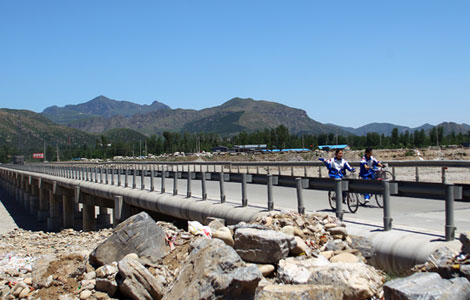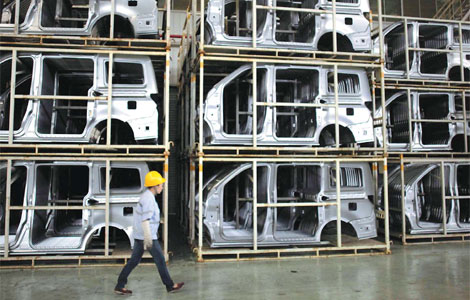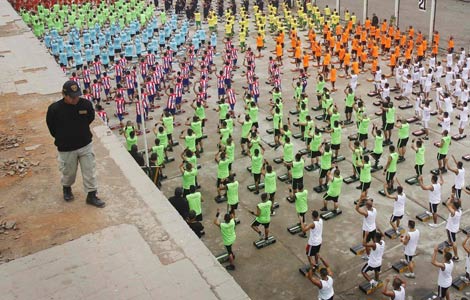China bytes back with fastest computer
Updated: 2013-06-18 02:23
By Pu Zhendong in Changsha (China Daily)
|
|||||||||||
Extensive application
In November 2011, a cooperation agreement was signed by the Guangdong provincial government, Guangzhou municipal government, the National University of Defense Technology and Sun Yat-sen University to establish a Guangzhou supercomputing center by the end of 2015. The center aims to become China's fifth national supercomputing center after Tianjin, Shenzhen, Changsha and Jinan.
The $407.5 million project features Tianhe-2, which consists of 170 computer cabinets. The leading supercomputer, covering an area of 720 square meters, also boasts memory of 1.4 petabytes and storage capacity of 12.4 petabytes. Tianhe-2 will reportedly be transferred to Guangzhou and put into operation in October.
Wang Bingqiang is among the many scientific researchers in Guangdong province with high expectations of Tianhe-2.
As head of the high-performance computing team of BGI, a leading genome research institution based in Shenzhen, Wang said that the company's scientific research and commercial projects rely on supercomputers like Tianhe-2.
"Genetic research produces tremendous amounts of data that need to be stored and processed by supercomputers," he said. "The better utilization of the supercomputer, the more time and resources will be saved for our benefits."
BGI launched the Million Human Genomes Project in November 2011 to decode the genomes of more than 1 million people.
This project aims to establish a research baseline and reference standard for specific populations, as well as to connect the phenotypes of diseases and traits with genetic variations to understand disease mechanisms.
It will guide innovative clinical diagnosis and treatment, and ultimately advance personalized healthcare and improve human health, said Fang Lin, deputy director of BGI Research. He added that the current guide system will no longer satisfy the enormous needs of calculation and data processing of this project.
"Suppose we are scanning for a high resolution genetic variation landscape over more than 500 human individuals. It would take a single computer more than four years to finish the work," Wang said. "With the guide system, it requires about five hours, yet with Tianhe-2 the same amount of calculation needs only 10 minutes."
Not only companies and research institutions will benefit from the forthcoming supercomputer — people will also enjoy the convenience brought by Tianhe-2's vast storage and high-speed calculations.
"For instance, an electronic medical records system can be established under Tianhe-2 so that a patient's previous diagnosis and treatments will be accessible by different medical institutions, avoiding repeated examinations as in the past," said Lu Zexin, technical director of the Guangzhou Supercomputing Center.
"More information sharing among different departments will also curb red tape and lift working efficiency," he said.
Genetic engineering, biomedicine and animation industries have long prospered in Guangdong province.
Li, deputy chief designer, said that scientists have considered demands from these clients during feasibility studies of Tianhe-2 to ensure it provides better service.
So far, more than 600 users have registered. Concerns over Internet security have arisen in the wake of the recent revelations of US Internet monitoring by its PRISM program.
Lu said that Tianhe-2 adopts the Kylin operating system, a quality research product with high security developed by the National University of Defense Technology. It provides strict data isolation to guarantee security according to the needs of clients.
Bright prospects
Researchers in Europe have called for more cooperation.
Sebastian Schmidt, an expert at the Juelich Research Center in Germany, said that the performance of Tianhe-2 and the design team are amazing.
"Development of supercomputers in the future will require much closer international collaboration, since it takes joint efforts to combat global challenges and to find solutions," Schmidt said.
Li, the deputy chief designer, said that the Juelich Research Center is now cooperating with the National Supercomputing Center in Tianjin on some challenging computational projects.
"By joining hands with China, Europe will also reduce its dependence on the United States in the area of supercomputing," he said.
Despite great progress, Liao, the chief designer, said that there remains huge room for improvement in energy efficiency, software application and development of a new generation of CPU.
"In the future, we hope domestic demands for supercomputing are fully tapped to stimulate us to design and produce supercomputers with better performance," Liao said.
China's supercomputing dream started in 1978 when then-Chinese leader Deng Xiaoping chose the National University of Defense Technology as one of the major institutions to develop China's own supercomputer.
Five years later, China's first supercomputer Yinhe-I came into being, which could perform 100 million calculations per second.
Supercomputing drew people's attention again in 2007, when Dawning, vendor of the Nebulae supercomputer, helped China National Petroleum Corporation discover 100 million metric tons of oil reserves under Nanpu in Hebei province.
Related Stories
China regains No 1 supercomputer title 2013-06-17 16:22
Europe-China co-op in supercomputing discussed 2013-04-09 03:52
Supercomputer super stars 2012-10-07 07:53
Chinese supercomputer Tianhe-1A in wide use 2012-04-23 17:39
Today's Top News
China's PV sector may see reshuffle: experts
China reduces US debt holding by less than 0.5 %
Anti-govt unrest continues in Turkey
US will not rush to war in Syria
Obama, Putin face tough talks at G8 summit
Czech PM steps down amid scandal
Policies to boost cross-Straits ties
Courts feel trials of global economy
Hot Topics
Lunar probe , China growth forecasts, Emission rules get tougher, China seen through 'colored lens', International board,
Editor's Picks

|

|

|

|

|

|





